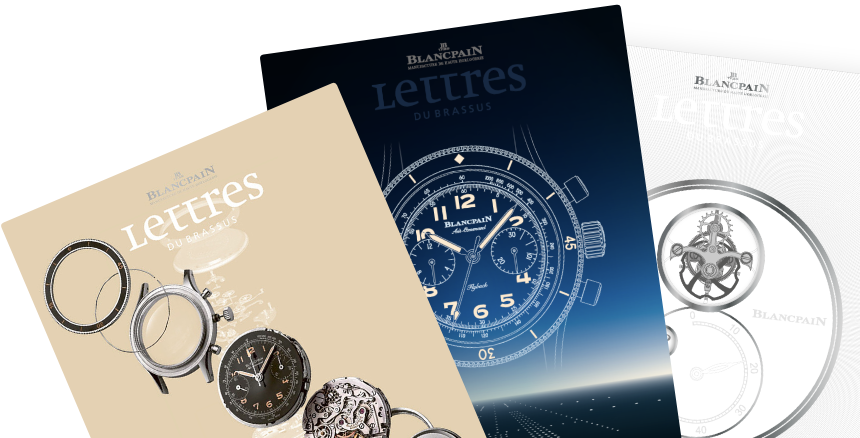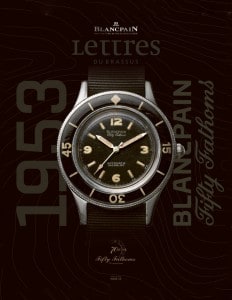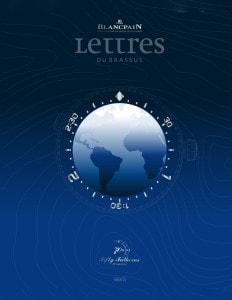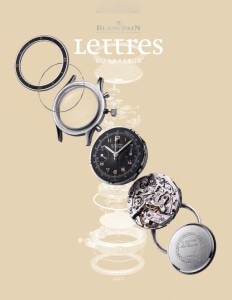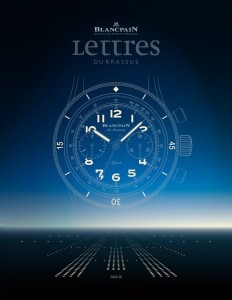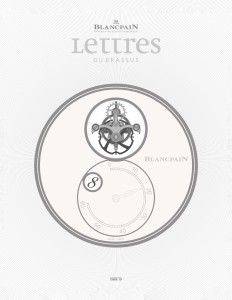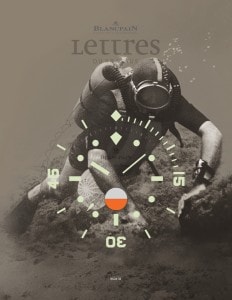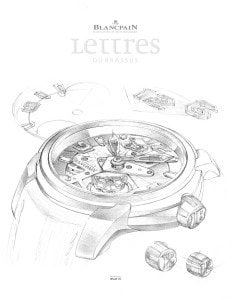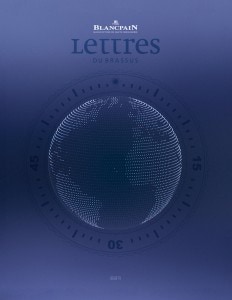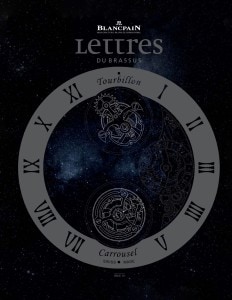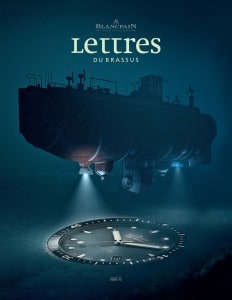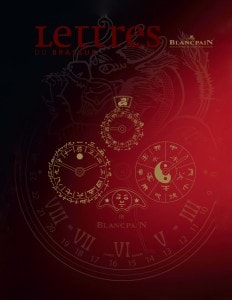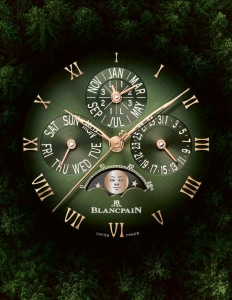
Search in Issues
Chapters
List of parts
Chapter 9
Blancpain-Imaginist LITERARY PRIZE
Blancpain has created a prize to honor extraordinary writing


BLANCPAIN AND MARCEL PROUST: EMBEDDED IN TIME, YET BEYOND TIME
“Why is it Blancpain launched a LITERARY PRIZE?” More than three years ago, a young journalist asked the question: “What does a high-end watch brand have to do with literature?” Maybe the question was too straightforward. The journalist who asked it seemed a little embarrassed, as if it might be perceived as negative, yet I understood exactly what she meant.
That was in the press conference right after the award ceremony of the first BLANCPAIN-IMAGINIST LITERARY PRIZE. I believe it must have been a question shared by many of her fellow journalists at the scene, who have followed either information about literature and publishing or watchmaking and other luxury trends for years. These two types of journalists are rarely seen in the same setting.
That’s because the boundary between literature and luxury has not always been that clear. Over the years, we’ve witnessed brands in an effort to enhance their visibility woo famous movie stars and pop stars with huge followings. And we have also seen the enlarged logos of many brands on the posters of contemporary exhibitions and other performing arts such as dance and drama. But how can literature have anything to do with luxury? Literature is so inconspicuous, so quiet, that it looks like the cover of a novel without enough space for the placing of a logo. Compared with the live scene of a noisy pop concert, literature is more like the song of a nightingale in the distance at midnight, which is intermittent, solitary and hazy. So why did Blancpain launch a literary prize?
As the cultural ambassador of Blancpain and the chief consultant of IMAGINIST publishing house, which co-founded the literature prize, it seems appropriate for me to respond to the question that I mentioned at the start. But I remember that I was a little bit stunned that day and didn’t answer this very straightforward question in a timely and smooth way. I am now delighted to have a chance to explain why my favorite novelist, Marcel Proust, unexpectedly came to mind within this context.
The BLANCPAIN-IMAGINIST PRIZE is the first literary Chinese award uniting the world of culture with that of fine watchmaking. Founded in 2018, this distinction aims to reveal and support talented and promising young writers, while also encouraging creativity and promoting Chinese literature.

Blancpain’s Literary Prize establishes a LINK between traditional fine watchmaking and literature.
For those who haven’t yet read In Search of Lost Time carefully, the mention of Proust probably reminds you of a melancholy, contemplative face. Apart from the fact that he was in poor health (his respiratory problems were never cured), Proust’s face took on an unhealthy whitish hue due to spending much of his life staying up at night and locking himself in a soundproof room. Having inherited a substantial fortune, he had very refined tastes and was well-educated. He also frequently visited the finest literary salons in his youth. But later he seemed no longer a part of this world, at least not in sync with it. Take for example a story that we’ve all heard, his memory of having a madeleine cake: he devoted four pages to describe the moment, as a child, when he enjoyed the snack on a Sunday morning. If you just gulp down your food, you should be able to eat at least four madeleine cakes during the time it takes to read these four pages. How could he live in the same world with his fellow human beings if he was always so sensitive to the past, using all his senses to recreate and feel the world that had passed by? Yet the monumental work he spent his life writing, with its long sentences and broken plots, its time-leaping consciousness, its profound artistic conception, permanently lags behind the hurried pace we tend to adopt. When we read the book, it is as if we have entered another space with a different time sequence, and when we close the book and return to the real world, most of us can hardly tell the difference between fast and slow, and find that one second is sometimes longer than a whole day.
The typical image of Proust is of an autistic and introverted individual who would never have been able to write the panoramic historical images of War and Peace. Nonetheless, how could a reader forget the social observations in the third volume of In Search of Lost Time if he or she has read the book carefully? Here, the Dreyfus affair which once tore France apart offers a fine example of Proust’s analysis of human society. This affair immediately recalls the evilness of anti-Semitism, the birth of the modern intellectual, as well as J’accuse written by Émile Zola. It might be surprising to note that Proust was deeply involved in the controversy as a young man. He had attended the civil rights movement, drafted manifestos, and been present at Zola’s trial from morning till night. But years later, in his novels, he took a cool-headed look at the various characters on each side of that era, observing their hidden motives, the reasons behind their opinions, as well as the strange shifts in their positions. More importantly, he shows us how the underlying values and ideological positions of a family or a group of friends can be exposed, leading to a huge, almost irretrievable split when confronted with a political and social event. He also addresses how this wound affects interpersonal relationships after the event.
In other words, Proust, who was thought unworldly by the public, devoted almost an entire book to documenting the most important events of his time. But what makes literature valuable, great novels remarkable, and Proust worthy of respect, is the recording of every single detail. This approach was by no means the most straightforward form of journalism, but instead a complete reconstitution. The structure of the novel is so detailed and profound that it not only gives us a clear view of France at the end of the 19th century, but also allows us to look at our own time today. Honestly, I would recommend to anyone who wants to get a clear idea of what’s happened in the world over the last few years, of the events that have caused friends to turn against each other, or even broken ties between father and son, that they should read In Search of Lost Time – or at least the third volume of this novel – very carefully.
So “Why is it that Blancpain launched the BLANCPAIN-IMAGINIST LITERARY PRIZE? What does a high-end watch brand have to do with literature?” It seems that I’ve gotten carried away. Why indeed did I think of Proust when faced with this question? It was because I saw a relationship between literature and time in his case. Since novelists do not live in a vacuum, their background and experience inevitably affect their writing, which is why we cannot help trying to read the signs of an era in a novel. However, as Proust once said, we should never substitute a novelist’s biography for his work, because “a book is the product of another self.” It is possible for a novel to abolish and transcend the constraints of time and space. Isn’t In Search of Lost Time such a work? It undoubtedly relates to France in the late 19th and early 20th centuries, yet it also has something to convey to those of us living in the early 21st century. It is a book about memory and time. Therefore, in a sense, it is a book beyond time. Isn’t a novel very similar to a timepiece in that respect?
Sometimes, when I sit quietly in my study late at night, staring at the beautiful seconds hand sweeping over the dial of my Blancpain watch and listening to the sound it makes, I am reminded that a timepiece really is a wonderful object. It constantly shows and records the passage of time, as if it were not part of the order of time itself, but instead enjoyed a solid objective existence beyond time and history. It is nonetheless clearly a product of time. Watches of different ages have different technologies and styles. So, when we look at an ageold watch, we can see on it the hallmarks of its time, and even imagine how artisans held their breath as they carefully assembled it. It amazes me that this authentic top-class watch continues to speak to me, to indicate the moments of my time, and even to remind me of my future. It comes from a certain point in history, but it is somehow beyond that time. The watch is both within and beyond time. It remains at the exact intersection between eternity and the present.
That’s certainly not how I responded to the journalist’s question. If I had done, I wonder how many people would have been able to put up with this ponderous association, and to accept my odd proposal that, in a sense, Blancpain can be compared to Proust. Indeed, we are not that patient anymore. After all, we are in a time when a two-minute video on the Internet may be too long for us. It reminds me of the 1980s, not long after China implemented the reform and opening-up policy, when TV was just becoming popular, and reading was still a major form of leisure. Back then, Jean-Paul Sartre’s Being and Nothingness sold hundreds of thousands of copies, about the same as today’s most popular science fiction novels. It was at that time that a number of courageous and imaginative authors emerged in China, writers like MO Yan, China’s first Nobel Prize winner for literature, YU Hua, SU Tong, Xi Chuan, Bei Dao, Can Xue, Ge Fei, A Lai, WANG Anyi, YAN Lianke, etc. These authors continue to shape China’s literary landscape and are famous among literary enthusiasts around the world. Probably all of them achieved greatness during that decade, not only enjoying strong reputations, but also attracting a large number of readers. Today, if you ask anyone on the street in any city of China how many contemporary writers they know, the answers are likely to be these well-known names mentioned above.

The works of the previous winners of the BLANCPAIN-IMAGINIST LITERARY PRIZE.

The candidates of the 2020 BLANCPAIN-IMAGINIST LITERARY PRIZE.
THIS IS A SALUTE from a three-hundred-year-old tradition to a three-thousand-year-old tradition.
But then what? There are of course still people who write seriously and others who read carefully. There are even several writers much younger than those of that generation, yet whose profound literary accomplishment and new styles have achieved excellence on a par with that of their predecessors. Still, as I mentioned above, times have changed and the reputation of a serious novelist is hardly comparable to that of a web celebrity who shows off his or her dinner on social media every day. If a person insists on literary creation, they must learn to accept the fact that there won’t be much applause and royalties. No matter how well they write, there is absolutely no chance for them to acquire the fame and fortune once enjoyed by their predecessors. But to be honest, I appreciate the current situation more. Because only when serious literature is left out in the cold, can people prove that they are still willing to devote themselves to writing no matter what the results or the future awaiting them, and that being a writer is a cherished destiny. There have of course been many literary youths who quit halfway down the road, who ended up being amateurs with a literary dream. They failed to resist temptation, lacking the faith that their dream would come true at last. They lacked Proust’s perseverance that extended to writing from his hospital bed the manuscript for his final book during the last moments of his life. I’m not in any way blaming them, because it turns out there are plenty of people who thought they were going to be the next Proust sacrificing everything, yet ended up disappearing in a pile of old books that no one would ever look at again.
So why should we organize this literary prize? It would be an exaggeration to say we are looking for the next Proust. But the reason we set 45 years old as the age limit for entry, and regard the potential to continue writing as a fundamental criterion, is a way of telling writers who continue writing that they don’t need to feel lonely, that someone has noticed them and understands them. It’s like a marathon runner in the middle of a race, finding someone on the side of the road applauding and offering a glass of water. As for what will happen next, who knows? Perhaps, having passed this halfway station, someone may indeed take up the baton of the previous generation, and record this age in his works, reflecting a shimmering light in the sunshine of another world after a thousand years, like a fragment of amber. Am I thinking too far ahead by saying one thousand years? Please don’t forget that Chinese literature is a long tradition passed down more than three thousand years ago by The Book of Songs. The man who chanted the first poem probably hadn’t thought of today when we may find our own thoughts in his words. Just as Proust probably hadn’t expected us to examine the world of the 21st century through his novels. If you know how to appreciate Blancpain, you will know what I mean. When Jehan-Jacques Blancpain founded the brand almost 300 years ago, did he know exactly what he would leave behind for posterity? For three hundred years, did each generation that had survived the changes know what they were holding on to? Why does Blancpain produce exclusively mechanical watches? Why not choose an easier, and more flattering path? I guess they are just like writers from every generation who take literature seriously, defend delicate taste, and transform their passion into destiny. They are unafraid of loneliness, keep a low profile and remain resolutely determined.
“Why is it that Blancpain launched the BLANCPAIN-IMAGINIST LITERARY PRIZE? What does a high-end watch brand have to do with literature?” If there were only one sentence to answer the question, I would say, this is a salute from a threehundred-year-old tradition to a threethousand-year-old tradition. They see themselves in each other, embedded in time, yet beyond time.

Other issues
Don't miss the latest issue
Sign Up for New Releases